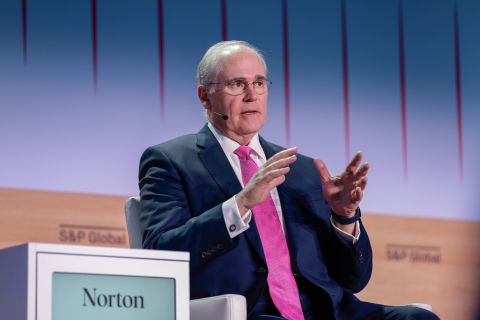Amidst the concerns that not enough young people are pursuing engineering or geoscience careers, it should be remembered that those who do will work their tails off during their undergraduate studies. By the time they graduate and become oil industry employees, they will have a wealth of technical knowledge.
And that’s where the real learning begins.
There’s a lot more to being successful in business than being well-educated, and this fact is not lost on the Houston Geological Society (HGS). Recently I had the distinct pleasure of attending an evening of “etiquette instruction” hosted by HGS and its “NeoGeos” group, comprising mostly younger geologists with only a few years of experience. The speaker was Randi Mays-Knapp, a professional etiquette instructor based in College Station, Texas.
I’m not sure what I was expecting, to be honest. What is the transition period, after all, between college students used to keg parties and young professionals who know a salad fork from a dessert fork? Apparently it’s not very long — the young geologists attending the event were well dressed, polite and extremely interested in what Mays-Knapp had to say.
While the usual pointers were given — which utensil to use when, which direction to pass condiments and seasonings — there was more focus on the big picture, what it all means and why it’s important. I asked Mays-Knapp to express that last point.
“If we didn’t have a set of rules to follow, it would be like driving in a town where no one paid attention to the stop signs,” she said. “It’s the ability to work together and have respect for other people.”
This respect begins the moment one heads through the door for a cocktail party or dinner. Mays-Knapp reminded the guests that the idea of a cocktail party is to network and meet people, not pig out on the free food and drink. She suggested standing by the door and welcoming people as they walk in — “People will remember you.”
She commented that dining “Continental” or European-style is more efficient than the American or “zig zag” style of eating (where you transfer your fork from your right hand in eating to the left for cutting), but she maintained that it’s best to dine in the style in which you feel most comfortable. “Whichever style you feel is best for you, the important thing is to hold your utensils correctly when cutting and moving food from your plate to your mouth,” she said. “You should hold the fork or knife in the palm of your hand and then wrap your fingers around the handle using your index finger as a pressure point at the place where the blade meets the handle (knife) and the head of the fork meets the handle (fork). Although eating as the Europeans do is, at first, uncomfortable, those who stick with it can understand why it would be a preferred method of eating.”
I tried eating my meat Continental style but found it rather uncomfortable. So I asked her about the potential to make people so self-conscious about their etiquette that they were unable to concentrate on anything else.
“It takes 21 days to develop a new habit,” she said. “How do you get better? If you find you need to address specific habits, practice in the comfort of your own home.”
For Alex Merecka, a production engineer with Schlumberger Information Services (SIS), the meeting was particularly useful. Merecka has been with SIS for a little more than a year after graduating from Texas A&M with a bacherlor’s degree in geology in 2004. Merecka is not a frequenter of NeoGeos events but thought it would be useful to learn some etiquette rules and do some networking.
“I had a pretty good idea of etiquette rules, but not all the small details,” Merecka said. “It’s reassuring to listen to somebody who knows proper etiquette. It gives me a little more confidence in business situations.”
Mays-Knapp added that most of the questions she receives during her presentations are the types of things most people worry about — when should you season your food? What if you have something caught in your teeth? “They’re simple questions,” she said. “I like it when people ask those questions — that means I’ve done what I need to do by creating a safe environment and not making them feel embarrassed. If one person has a question, chances are everyone else does too.”
However, during the HGS dinner some tougher questions did arise. There was quite a bit of discussion about whether or not to tip bartenders at cocktail parties. One attendant insisted that the bartenders were working hard and deserved tips; another said she’d be “horrified” if her guests felt they needed to tip the staff.
“You can know the rules, but you have to think about common sense,” Mays-Knapp said.
Overall, she said, it’s good to know rules of etiquette but to be aware that they change from culture to culture. “Whatever happens, be gracious.”
Should this be a required course for soon-to-be graduates? Maybe not, but a little fine-tuning certainly wouldn’t hurt. “A lot of people coming out of school don’t have a lot of exposure to formal settings,” Merecka said. “I think it’s a good idea for people getting out of college [to have etiquette training], especially when they’re doing interviews. It could really make a difference.”
Recommended Reading
ONEOK CEO: ‘Huge Competitive Advantage’ to Upping Permian NGL Capacity
2024-03-27 - ONEOK is getting deeper into refined products and adding new crude pipelines through an $18.8 billion acquisition of Magellan Midstream. But the Tulsa company aims to capitalize on NGL output growth with expansion projects in the Permian and Rockies.
EQT Ups Stake in Appalachia Gas Gathering Assets for $205MM
2024-02-14 - EQT Corp. inked upstream and midstream M&A in the fourth quarter—and the Appalachia gas giant is looking to ink more deals this year.
EQT Deal to ‘Vertically Integrate’ Equitrans Faces Steep Challenges
2024-03-11 - EQT Corp. plans to acquire Equitrans Midstream with $5.5 billion equity, but will assume debt of $7.6 billion or more in the process, while likely facing intense regulatory scrutiny.
Matador Hoards Dry Powder for Potential M&A, Adds Delaware Acreage
2024-04-24 - Delaware-focused E&P Matador Resources is growing oil production, expanding midstream capacity, keeping debt low and hunting for M&A opportunities.
Ohio Oil, Appalachia Gas Plays Ripe for Consolidation
2024-04-09 - With buyers “starved” for top-tier natural gas assets, Appalachia could become a dealmaking hotspot in the coming years. Operators, analysts and investors are also closely watching what comes out of the ground in the Ohio Utica oil fairway.





